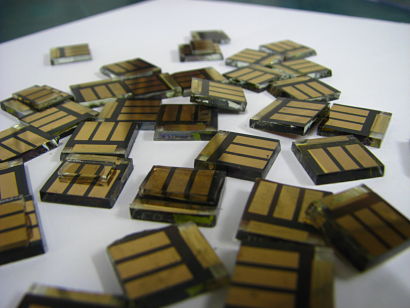
Flexible perovskite solar cells (PSCs) are promising for lightweight and versatile applications but their sensitivity to humidity and temperature poses a challenge to long-term durability. To address this, Japanese researchers have tested the degradation of these solar modules under extreme heat and humidity. Through accelerated testing, they identified how the water vapour transmission rates of barrier films affect the module’s stability, giving critical insights for development of durable solar cells.
a team of researchers led by Professor Takashi Minemoto, a Ritsumeikan Advanced Research Academy Fellow from the College of Science and Engineering, Ritsumeikan University, Japan, along with Dr. Abdurashid Mavlonov from the Research Organisation of Science and Technology, Ritsumeikan University, and Dr. Akinobu Hayakawa from Sekisui Chemical Co., Ltd, recently conducted pioneering research to investigate the durability of these PSC modules in harsh environmental conditions. The study was made available online on December 17, 2024, and was published in Volume 286 of Solar Energy on January 15, 2025.
“Perovskite solar cells stand out as particularly promising due to their low-temperature wet-coating process and compatibility with flexible substrates, offering unique opportunities for the solar industry” said Professor Minemoto. “However, the stability of perovskite is weak compared with conventional material, which can be improved by fabrication processes such as encapsulation with barrier films.”
To analyse the durability of flexible PSC modules, the research team utilised PSC modules made of methylammonium lead iodide (MAPbI₃), which were encapsulated with polyethylene terephthalate substrate having barrier films of varying water vapour transmission rates (WVTR). The PSC modules were subjected to a damp heat test, which utilised exposure of the modules to 85 °C temperature and 85 percent relative humidity. The conditions were thus set to simulate real-world outdoor conditions over extended periods.
After 2,000 hours of exposure, the photovoltaic (PV) performance of the modules was recorded, and the degradation of the modules was confirmed through characteristics of current voltage, spectral reflectance, and electroluminescence.
The researchers found that high humidity led to the decomposition of the MAPbI₃ layer into lead iodide, blocking the charge transport across layers. This degradation led to a significant reduction in the efficiency of the PSC modules highlighting the detrimental impact of moisture on the PSC performance.
In addition, the findings revealed that the quality of the barrier film played a critical role in the module’s stability. Notably, the module with the lowest WVTR barrier of 5.0 × 10⁻³ g/m²/day retained 84 percent of its power conversion efficiency. However, the modules with higher WVTR experienced rapid degradation, ceasing to function after just 1,000 hours.
“Our study is the first to report the durability of encapsulated flexible MAPbI3-based PSC modules” added Professor Minemoto. “When considering solar energy applications for walls and rooftops with weight limits or for mobile platforms, flexible PSCs are a great alternative to the traditional silicon panels. Insights from our study could help industries optimise these modules for highly stable and durable constructs.”
The study highlights the importance of barrier films in maintaining the long-term durability of flexible PSC modules, revolutionising the PV industry. Additionally, by offering energy generation at multiple locations, these innovations can help reduce strain on power grids. Furthermore, improving the durability of PSC modules could also expand the use of renewable energy since it would allow the deployment of PSC modules in diverse environments, thus accelerating the global shift towards cleaner energy and a sustainable future.
For additional information:

